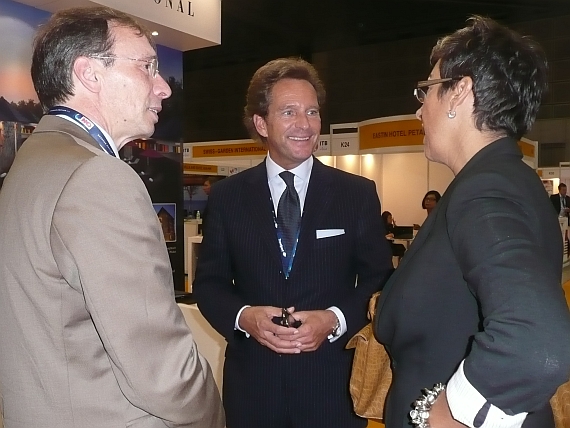ITB Asia and Singapore Hotels highlight new challenges
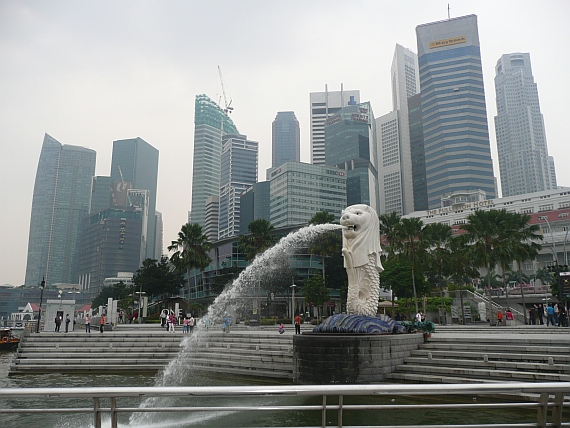 |
|
| The belt of towers behind the "Singapore Merlin" becomes tight: New towers arise at the left side. |
Singapore (November 5, 2010). Exhibitors in Asia focused strongly on MICE business as conferences and incentives generate a higher yield than package-deals do, the organisers of the ITB Asia, Messe Berlin (Singapore), noted this year. However, meeting business remains volatile, especially in the luxury segment, as one discussion during the 3rd ITB Asia two weeks ago revealed. "Today we negotiate expectations," one expert described from the podium. Off stage, new hotels fan new expectations and competition. The new Marina Bay Sands complex in Singapore is a symbol here. Its three towers and 2,500 rooms form an event and guest factory from which both established and new hotels alike would like to profit.
Frankfurt Airport has more appeal than the cold, soulless lobby connecting the three hotel-towers of the new Marina Bay Sands complex. The concrete balustrades housing thousands of rooms tower above; right and left, gigantic flower vases and reception points line the walkway. Here, the guest is part of the tourism machine; a cog in the works. For 20 EUR, the guest may step out on to the roof to enjoy panoramic views of Singapore. The infinity pool is indeed a highlight in which guests seem to swim into Singapore''s skyscraper skyline.
"Everyone is talking about Marina Bay Sands," Ian Wilson says, Regional Vice President Asia and General Manager of the Fairmont Singapore, describing the PR power of the colossal hotel which can best be admired from the executive lounge in the Fairmont. When everything is finally completed at the Marina Bay Sands, colleagues will be permanently kept busy organising mega events – and already Singapore will be short of rooms… All hoteliers hope to benefit from the Marina Bay Sands and the new resorts on Sentosa Island.
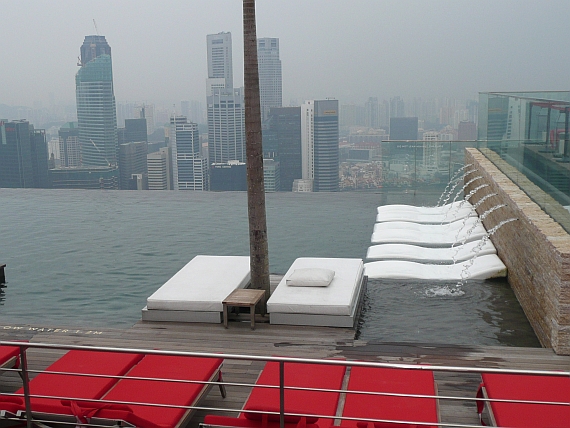 |
|
| Swimming in the sky: The roof-top pool of Marina Bay Sands allows breathtaking views. |
The "hub" Singapore also increases hotel salaries
That hotel occupancy figures (currently over 80% on average) in Singapore are currently recovering just as quickly as they fell in the crisis year 2008/2009 is explained with reference to many changed trends: Many banks have discovered the city state as a hub for transactions, especially in the private banking sector. The result is seen in many new office buildings and new jobs. Singapore is also becoming a "hub of learning", as Wilson formulates. After Cornell University, Yale also plans to establish a college in Singapore. This will ensure part of Singapore''s future innovation potential.
Insofar, the Fairmont Manager''s view of Singapore is in many respects (again) rosy. The hotel is already noticing the boom from its business traveller bookings, which have again climbed by 30 to 40 percent - 20 percent of these come from the city''s new banks. Occupancy is increasing and in the first half-year of 2010 was only one percentage point behind its peak in 2007. Nevertheless, rates aren''t increasing quite so rapidly, and the majority of business remains extremely short-term.
New business and further hotels in the city also present hoteliers with other challenges. The sector currently anticipates salary increases of 4.5 percent for 2011, for instance. Ian Wilson will also have to follow suit here, as motivated and well-qualified staff will help determine success or failure in such a competitive environment. Fairmont Hotel Singapore and the two sister hotels, Raffles and Swissôtel, employ a total of 2,700 staff.
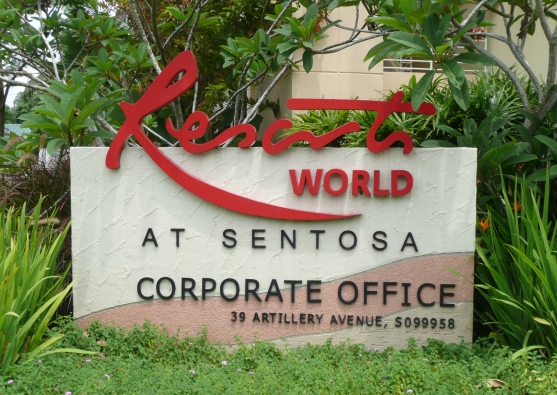 |
|
| Except for Marina Bay Sands, the World at Sentosa Resorts contribute most beds to Singapore''s inventory. / photos (4): map |
The luxury hotel on Raffles Square is sure of support from the parent company: Fairmont Raffles International is currently in the process of strengthening development for Asia and thus its rate of expansion. Readiness to travel and consumption are again increasing, and the loyalty of Asians to the hotel brand is large. The speed of expansion thus increases customer retention.
MICE in the luxury segment: Winning points with sensitivity
Customers are also becoming increasingly confident, more sensitive and more demanding. This too is a result of the crisis, as became clear during the ITB Asia at the first "Luxury Meetings and Incentives Forum". Host Bill LaViolette, publisher of the planning guide "Incentives & Meetings International", cited figures from STR Global which showed MICE business in luxury hotels to have slumped drastically last year across the entire globe.
So what remains to be done to strengthen the tender beginnings of the current recovery? Core statements quickly begin to stand out. Highly professional staff for meeting organisation are required – and this begins before the event, Andreas Kohn says, Sales and Marketing Director of the Ritz-Carlton Millenia, Singapore. Additional benefits must be offered, Sanjay Seeth says, a representative of the organiser The Event Company.
Listening is the key word; listening to the customer. "There were many cancellations in 2009 in which customers paid in full," Jackie Seah, Regional Director South East Asia for Hilton Worldwide, added. "Companies simply wanted no further financial excesses, no more events, the costs of which must be first authorised by headquarters…" This attitude cost Hilton almost half of its meeting business.
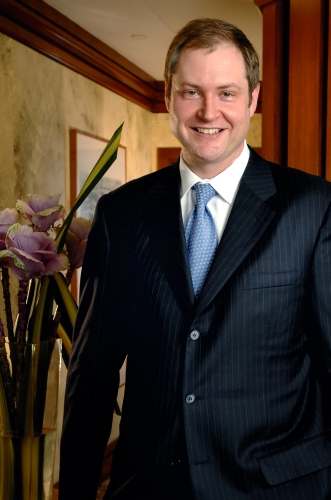 |
|
| Ian Wilson, Fairmont. |
The consequences: Today, companies regulate group size and expenditure much more closely than they ever did before. The trend is towards smaller, more exclusive incentives. And this poses an opportunity for luxury and boutique hotels with fewer than 125 rooms. Discussion participants generally agreed with Sanjay Seeth''s opinion: "We negotiate expectations with customers!". Because, due to the crisis, luxury has now become more affordable than ever, customers demand all the more. Nevertheless, every 5-star hotel is still suffering from loss of more price-conscious customers to 4-star hotels.
So what can luxury hotels do to win points in MICE business? Important is a strong brand name which fulfils on its quality promise, comfort and time-savings with perfect organisation and above all more sensitive organisation. "Our work begins with the request of proposal," Andreas Kohn highlights. "And we must pay attention here that it doesn''t descend into an electronic bidding war."
Bill LaViolette summarised: A new flexibility has established itself in the MICE segment. A hotel should stand by its (quality) promise, remain authentic, not blind the customer with detail but provide quality advice. The focus is no longer on banal additions such as drinks, but on what the customer intends to achieve through the event. / Maria Puetz-Willems
|
STAFF - A GUARANTEE FOR SUCCESS
Singapore/Frankfurt (November 5, 2010). For Steffen Weidemann, IFH CEO in Frankfurt, the ITB Asia was a complete success – and one more reason to think about the value of qualified staff. The mood is again very positive in Asia, and staff are sought in large numbers – particularly those with prior qualification. This also creates new business for the Frankfurt-based German and internationally operating training, auditing and consulting company. At the same time, it illustrates a serious imbalance between the two worlds. In Germany, hoteliers are currently investing a total of 889 million EUR in their hotels. 95% of this, or 847 million EUR, will be invested in "hardware" and only 1.5% or 13 million EUR in employee training. These shocking figures are the results of an investment survey published at the end of August by the German Hotel Association (IHA). "How much money would remain if the rooms were redecorated less often?", Steffen Weidemann asks, "investing this money in staff training has a much greater leverage effect in terms of guest satisfaction and retention." Whether we''re talking about a qualified and detailed response to conference enquiries (see text) or working processes behind the scenes, employee behaviour will everywhere decide on the success of a business. IFH is now in the process of developing a sort of "quality index" with which quality can be illustrated. / map |
|
|||
To print this article you have to be registered and logged in for newsletter, visitor or subscription.






